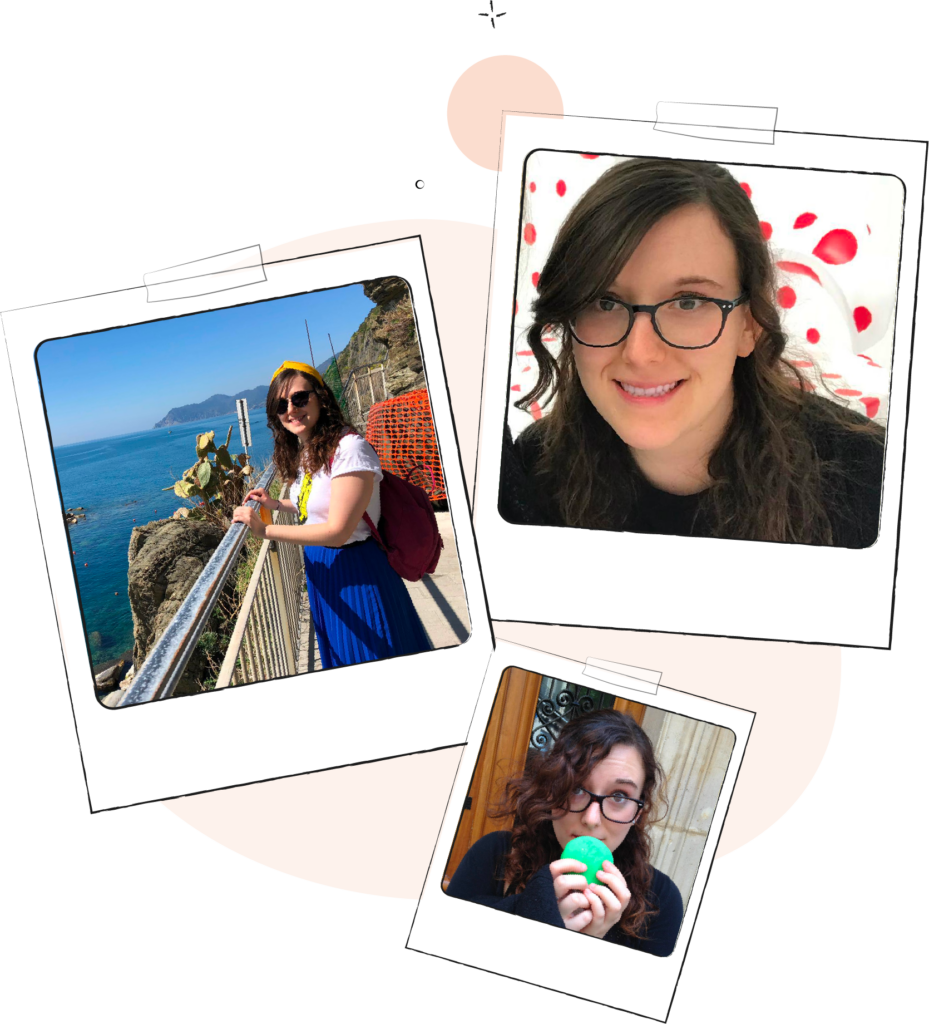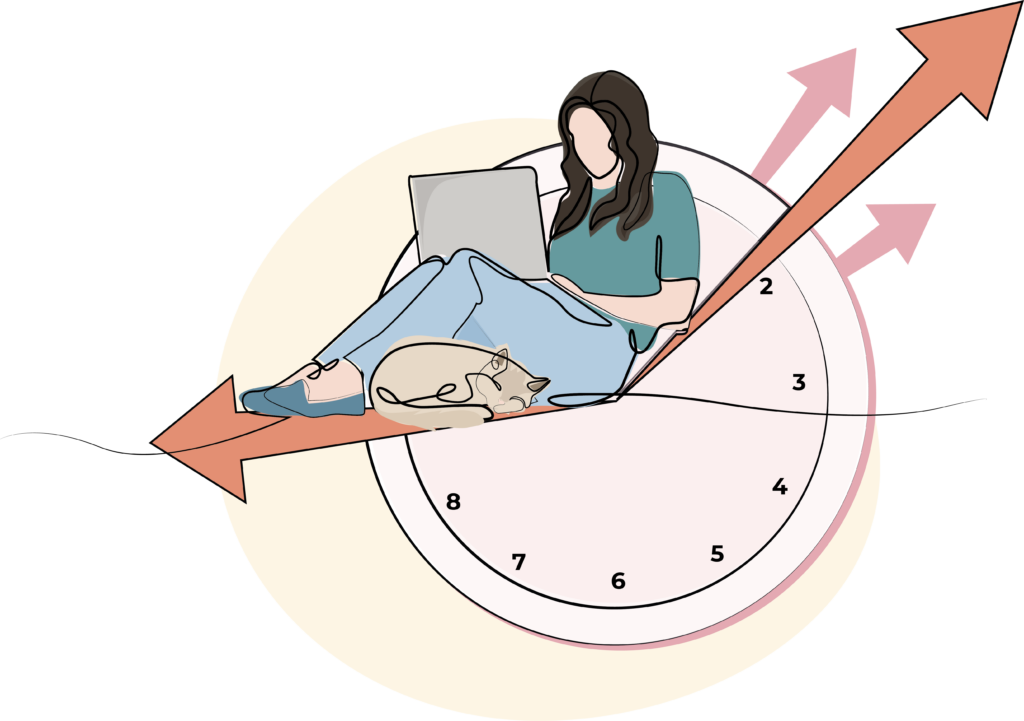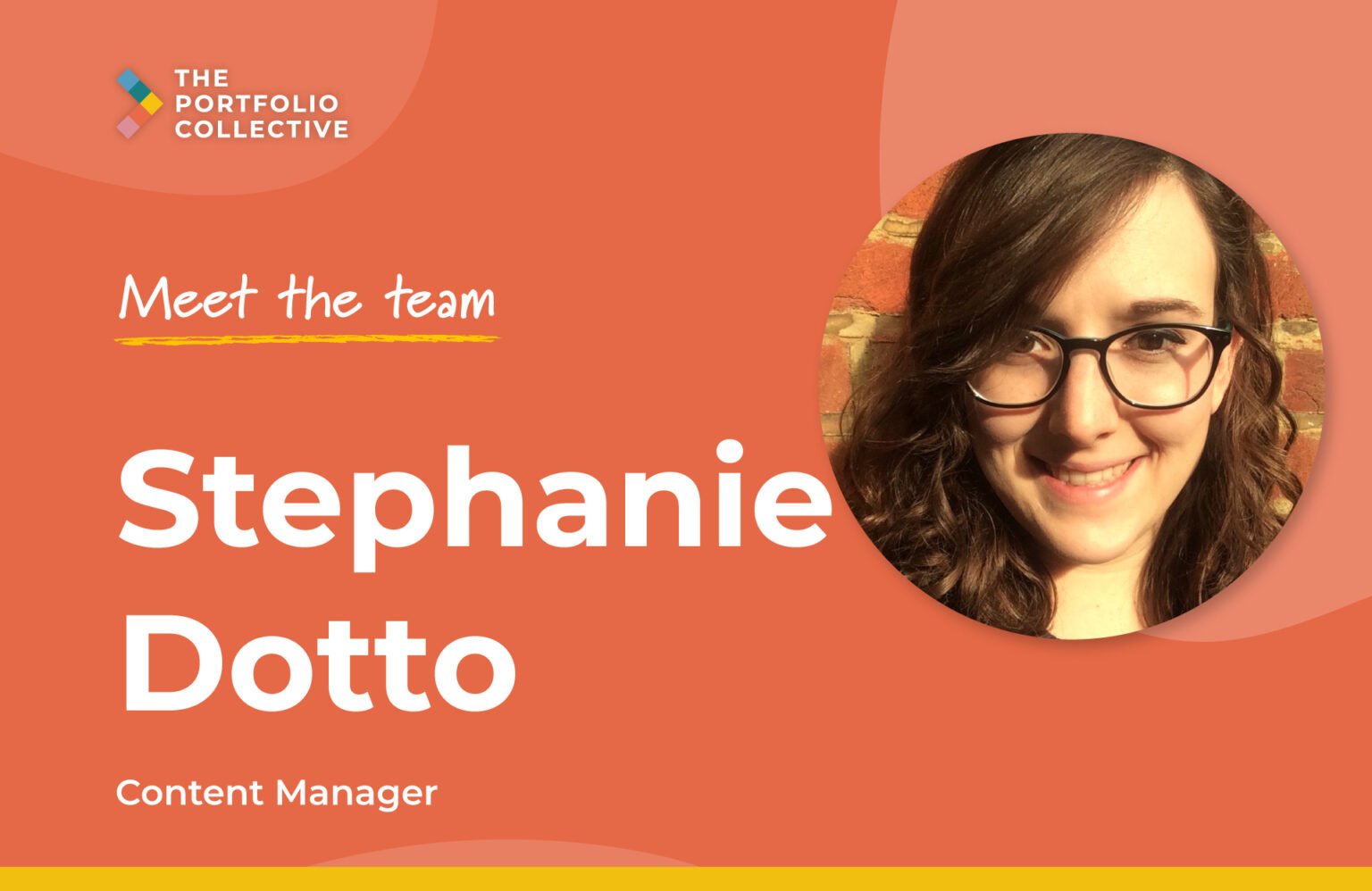Lexi Radcliffe-Hart
Normally Stephanie Dotto is on the other side of the interview table, having taken up the role as our Content Manager a little over a year ago – but this week, we thought we’d take some time to get to know her story.
Stephanie’s experiences through all sides of the marketing mix, different sectors and a lengthy time ‘at school’ has meant she’s truly found what skills she can use to the best of her ability, no matter the limited time available to her.
We sat down and asked her why she loves having a portfolio career, how she found The Portfolio Collective and what she is aiming for in the future.
We’d love to know, what does your role at The Portfolio Collective look like day-to-day?
I’m the Content Manager at The Portfolio Collective. I joined roughly four months after TPC started as a part-time content writer (two days per week) whose job was to solely write articles. In the beginning, that’s what I did – smashing out two or three a week! But of course, the traditional nature of a startup meant that my role changed quite quickly. My job has since morphed and expanded quite a bit, and because I was so enthusiastic about TPC’s mission, and I loved working with the company, I took on more hours.
Now I work three days a week, and I’m responsible for all content. That covers articles, copywriting and SEO for the website, and our email communications. I also support the rest of the marketing and design team, which includes helping with social media, proofreading other areas of content and, most recently I’ve taken on the management of our partnerships.
All the things! Clearly, you had more skills than just content writing before you joined TPC. What was life like before The Portfolio Collective?
I went to university to do Creative Writing, and as most people who study Creative Writing learn, you either go on to work in publishing or you work in marketing. Because of course, you don’t immediately start making money as a writer, or at least doing your own creative writing. So, the best paid routes are those two paths.
This meant I kind of fell into content marketing, first working as an intern at an English language school for about two and a half years. And that’s where I learned a lot about writing for marketing purposes, as well as a little about how SEO works. Then I went on to actually work in a job where I was a Content Manager and SEO expert. I think, as with most people, through all the different jobs that I’ve had, I’ve gained different skills that have all become valuable to the work that I now do at TPC.
That’s an important point – we all need to be aware of how we pick up those skills along the way. In marketing, building up those skills is vital because every role is different, right?
Yeah! There are so many roles where I’ve learnt along the way. I’m originally from Los Angeles, and before I moved over to London, I was studying in San Francisco. During that time, I was a music writer. I also did a little bit of travel and tourism writing, where I wrote for a wine website. That was pretty cool! I got to go to Napa and visit some of the wineries. I literally knew nothing about wine, but was learning along the way.
Then, when I was doing my master’s degree, I worked as an editor for an online creative writing blog. So, I’ve had experience doing a bunch of different styles of writing, which was really valuable, especially in content marketing, because it teaches you to be versatile in everything you do.


You’ve had quite an established educational journey, which you’re still on. Obviously, you’ve had other opportunities that have come up, because you’ve been doing extra learning. How has that helped steer your career?
I have been in adult education for a very long time. When I first started university, I actually was studying to be a Theatre Tech major. And then I realised quite quickly that I wasn’t interested in that. I love the theatre, but I’d always been interested in writing, so I switched over to a Creative Writing degree. And then in my last year of my Bachelor’s, I decided to do a Master’s and that’s when I moved to London.
I got into Kingston University and did a two-year MFA with them, which is actually something which isn’t very common in the UK; MFAs are more common in America. This was important for me because it’s a two-year Master programme that gives you teaching accreditation.
After university, I started working in marketing, and I enjoyed marketing; I found that it was something that I was good at. But I still really wanted to go back to teaching, and I think that was something that was always in the back of my mind. When the pandemic hit, I saw an opportunity to go back and do my PhD part time, and that’s how I found TPC.
Shifting from full-time work to part-time work wasn’t really easy, especially when you needed to find a part time job that could actually pay you a living wage. I was previously working with the charity sector, and I really wanted to work with a company that I believed in and I felt like was doing work that was making a difference in people’s lives. But working part time within that sector has a really low pay rate, and that was not a viable option for me. So, when I found TPC, it was this wonderful moment where I thought, “Oh my God, this ticks all my boxes. These guys sound amazing. They’re flexible. Something that I love doing is helping people find work that they’re passionate about. And it’s also something that I can fit around my learning.” It was just the perfect match.
Obviously, content in marketing is something that you love to focus on, and you’re involved with a lot of other different things in TPC now. Are there any other elements that you have really loved to be involved with?
In writing a lot of our articles, I have the opportunity to interview and get to know the community, learning their stories. All of the research and the information that I get needs to come from a place of truth and experience, so I speak to our community and embed their stories into what I’m writing. I really love that process.
When I speak to the community, I learn things that others aren’t talking about. I learn to see things from a new perspective, and I think that’s so valuable for our readers, because they’re not just having something told to them, they’re learning from somebody’s actual life. That’s more likely to encourage people to be brave, and take that step into a portfolio career because there’s authenticity there.
Authenticity is a big part of portfolio careers. You’re very good at balancing lots of different things, but I’m interested in how you manage to balance a PhD, alongside The Portfolio Collective! How do you go about setting clear boundaries between your work and your education?
I’ve always been very, very adamant, in every single job that I’ve ever had, that I set boundaries between work and my life. I know that a lot of people will do more than what’s necessary, because they feel like that’s what the company wants, and I think that’s a kind of culture that has been ingrained into us for a while. We feel we need to work that way in order to succeed and to move forward and to progress in our jobs. But in reality, if you’re doing your job well, in the amount of time that is allotted to you, then that should be enough, you shouldn’t be expected to do more than that.


That’s one thing that I think Fiona and Ben and the rest of TPC have been really great about. They’re not time crunchers, they’re not expecting you to put your entire life into the job. We’re all passionate about what we do here, and we all want to work as hard as possible for TPC, but that doesn’t mean that you have to work every weekend and evening. And because I work part time, I think it actually gives me the permission to say “okay, no, I only work 30 hours a week. So, I’m shutting off at 6pm.” If it’s not done, it’ll get done tomorrow, and that’s not the end of the world. I think that’s something that people and companies in general need to learn to be a little bit better about.
I have set days for my PhD and set days for TPC, so I am in different mindsets on different days. On my study days, I’m just doing that and my brain is engaged differently and focused differently than my TPC days. And I don’t ever let the two overlap.
Yeah, that’s a very good way of doing it! Although there’s a structured story, a connecting piece that ties all of your work together, it feels like you may be a multi-hyphenate or you may want to be at some point – you’ve already had so many different kinds of roles to build up your experience. How has staying versatile added to your portfolio career?
I think it’s inspired me to not limit myself. I know when I decided to go back and do my PhD, I had a mini-crisis. I don’t think I was alone in the timing of it – a lot of people had this during the pandemic. I looked at what I was doing, and I said, “Do I enjoy marketing? Do I enjoy the type of marketing that I’m doing?” This wasn’t what I had planned originally, and I do feel that I kind of fell into it. And initially, I thought, “No, I don’t like this. I feel like marketing isn’t helping people in the way that I want to be helping people – in the way that teaching would.”
So initially, I wanted to make the switch completely. Complete my PhD, teach, and leave marketing behind. But what I’ve learned through working at TPC is that you can do this job in a way that does help people and does make a difference and leaves a positive impact on the world. So I can teach, but I also can do marketing. In the future, I will mix teaching with the occasional marketing jobs because it’s something that I enjoy and something that I’m good at when I’m working with the right people.
That’s a really good way to look at it – making sure that your values are met across the board. You’ve tipped on what is next, but what do you hope to achieve as The Portfolio Collective continues to grow and develop?
I think it’s an interesting question, because we constantly try and plan for what the future of TPC is going to be. And we have some really great ideas. But again, I think we’re constantly surprising ourselves. When I think about what I want to do at TPC, it may not actually be what I’m doing at TPC in six months’ time, but it doesn’t mean I’m not going to like what I’m doing in six months’ time because I discover new interests and new strengths and new passions along the way.
I think I actually would like to start doing a little bit more teaching through the community. We’re introducing a lot more masterclasses, and we’re doing a lot more interactive events etc, so I think that’s definitely a side of the business I’d like to get more involved with.
Ready to kickstart your own portfolio career? Become a member of our community and you can learn directly from others who have made the journey before you. You can also reach out to the rest of the team to find out why we’re so passionate about what we do and discover how The Portfolio Collective can change your career.
Think this sounds like the right path for you? Come along to our monthly Get started event for new members to find out what a portfolio career could look like and how The Portfolio Collective can help you take those first steps towards professional success – and don’t forget to connect with our community!



